CEOs more Progressive than University Deans?

There’s no doubt women get the short end of the stick in organizations. Not only is there a well-documented wage gap, but research shows women are more likely to be passed over for promotions, even when they are as qualified as other candidates. Then there are negative attributes applied for women -- assertiveness is branded as aggressive; passion is dismissed as emotional; confidence is seen as arrogance. The list goes on.
Are there times when women are assigned positive attributes? Are women seen as being more collaborative than men? Collaboration is certainly a positive leadership quality, and critical for organizations with cross-cutting teams. Is it possible that women are viewed as being more inclusive? Studies have tied inclusion to psychological safety. What about being more genuine -- a key attribute to building trust?
As the corporate world continues to change, employees and customers expect companies to be good, not just act good. B Corps are growing in number. And the number of women on corporate boards are growing. We began to wonder if women could be seen as being more committed to progress than men? Are women who lead firms engaged in progressive practices -- like environmental responsibility and diversity -- viewed as more committed to the initiatives, than men doing the exact same thing? Is the corporate world lagging behind other industries in terms of progress?
To test this, we created profiles of a consulting firm CEO and a business school Dean, with a version for each gender. We included the academic setting to see if patterns held across industries. Within the industry, profiles were the same, just with different names - one for Michelle Davis and the other for Michael Davis. The leadership profiles highlighted initiatives around diversity and inclusion, environmental responsibility, and work-life balance. We also looked at attributes such as caring, authenticity, and passion. Across the industries, we focused on similar initiatives that made sense for that industry. We gave these profiles to 103 MBA students enrolled at a mid-sized university. Based on the profiles, students completed a short survey about their perception of the leader based on the initiatives and attributes.
Who did we talk to?

We expected the obvious -- female leaders to be viewed as more progressive than male leaders, and academic leaders viewed as more progressive than corporate leaders.
Regardless of industry and out of the 20 questions we asked, the only significant difference between female and male leaders was the concern for human welfare. Female leaders scored higher. Female leaders also scored higher on commitment to work-life balance compared to their male counterparts, but only in a corporate setting. Our hypotheses were confirmed.
Not really! The results were not as expected while comparing leaders across industries. And so, we kept looking.
Regardless of the gender, corporate leaders were seen as being more committed to progressive initiatives than the academic leaders. You read that correctly - corporate leaders were viewed as being more progressive.
Attributes where corporate leaders scored higher

It seems that the industry is more committed to progressive initiatives -- gender may only be a secondary influence.
These results are a shift from traditional thinking about academia and the corporate world. For centuries, academia was seen as a progressive hot bed. Studies have found a larger percent of professors identify themselves as liberals/Democrats than conservatives/Republicans. These beliefs are more politicized today.
Leading conservatives argue that higher education is indoctrinating youth with liberal, progressive ideology. There are abound pieces about the “liberal echo chamber” and “liberal intolerance” in higher education. Phrases such as “anti-intellectualism” and “anti-elitism” are thrown around in political discourse. However, previous research around progressive views in academia focused more on social scientists or did not distinguish the area of study. Less is known about the progressive views in business schools - a place that mixes the stereotypical progressive views on academia and traditional views on business.
Our study shows that the corporate industry is a stronger driver when it comes to progressive values, than just the gender. We posit three reasons why corporate leaders are viewed as more progressive than academic leaders. First, corporations have further to progress than academia. Second, corporations receive more publicity for progressive initiatives. Third, corporations are more reflective of changes in societal norms.
A larger change is more noticeable than a small change, regardless of the starting point. Corporations have been viewed as prioritizing traditional values - financial strength and competitiveness - over progressive values for decades. As corporations have increased their commitment towards progressive values, the focus is on growth -- even if they are just catching up with other industries.
As corporations make commitments towards progressive values, they receive increased publicity. Companies make public commitments to increase their diversity and inclusion, to reduce their environmental impact, and to showcase their emphasis on work-life balance. Because of their historical views on these progressive values and their perceived contradiction to profits, these initiatives become newsworthy. Even the fact that these progressive values do not hurt profits but can raise profits, is newsworthy.
Finally, corporations are a stronger signal that societal norms are shifting. Previous research has shown that changing corporate culture and perceptions are not easy. As companies develop and stick with progressive policies, it is an indicator that societal norms are changing as well. To grow, increase profits and keep the best talent, corporations need to match expectations of their employees and customers.
Overall, our research shows that the corporate industry is a stronger reflection of commitment to progressive values -- gender may only be a secondary influence. We posit three reasons for the shifting views on progressive industry -- first, corporations had more ground to make up and their effort is being recognized; second, corporations receive more positive publicity for their commitment to progressive values; third, the commitment to progressive values in corporations is a stronger indicator of changes in societal norms.
James R. Bailey is Professor and Hochberg Fellow of Leadership Development at the George Washington University School of Business. Dr. Bailey is the recipient of many teaching distinctions, including four GWSB Outstanding Faculty Awards. In 2006, he was named one of the world’s top ten executive educators by the International Council for Executive Leadership Development. Hillary Phillips is a non-profit marketing professional. She is also an M.B.A. student at the George Washington School of Business.
© Copyright IBTimes 2024. All rights reserved.





















